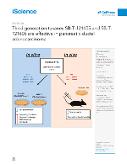Third-generation taxanes SB-T-121605 and SB-T-121606 are effective in pancreatic ductal adenocarcinoma

Autor
Sychra, Tomáš
Balatka, Štěpán
Václavíková, Radka
Ehrlichová, Marie
Truksa, Jaroslav
Sandoval-Acuna, Cristian
Kočí, Kamila
Tesařová, Tereza
Chen, Lei
Ojima, Iwao
Datum vydání
2024Publikováno v
iScienceRočník / Číslo vydání
27 (2)ISBN / ISSN
ISSN: 2589-0042Metadata
Zobrazit celý záznamKolekce
Tato publikace má vydavatelskou verzi s DOI 10.1016/j.isci.2024.109044
Abstrakt
Pancreatic cancer is a severe malignancy with increasing incidence and high mortality due to late diagnosis and low sensitivity to treatments. Search for the most appropriate drugs and therapeutic regimens is the most promising way to improve the treatment outcomes of the patients. This study aimed to compare i) in vitro efficacy and ii) in vivo antitumor effects of conventional paclitaxel and the newly synthesized second (SB-T-1216) and third (SB-T-121605 and SB-T-121606) generation taxanes in pancreatic KRAS wild type cell line BxPC-3 and more aggressive KRAS G12V mutated Paca-44 pancreatic cancer cell line models. In vitro, the efficacy of paclitaxel was 27.6+-1.7 nM, while SB-Ts showed 1.7-7.4 times higher efficacy. Incorporation of SB-T-121605 and SB-T-121606 into in vivo therapeutic regimens containing paclitaxel was effective in suppressing tumor growth in Paca-44 tumor-bearing mice xenografts at small doses (<=3 mg/kg). SB-T-121605 and SB-T-121606 in combination with paclitaxel are promising candidates for the next phase of preclinical testing.
Klíčová slova
pancreas, carcinoma, paclitaxel, Stony Brook Taxanes, treatment outcome, in vitro, mouse models, in vivo
Trvalý odkaz
https://hdl.handle.net/20.500.14178/2362Licence
Licence pro užití plného textu výsledku: Creative Commons Uveďte původ-Neužívejte dílo komerčně-Nezpracovávejte 4.0 International







